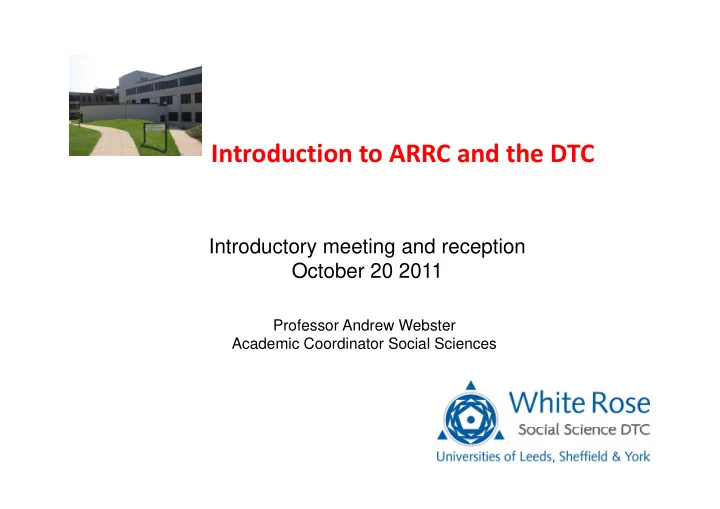

Introduction to ARRC and the DTC Introductory meeting and reception y g p October 20 2011 Professor Andrew Webster Academic Coordinator Social Sciences
1. Alcuin Research Resource Centre (ARRC) Primarily a research facility accommodating PhD students, academic and support staff and a range of research facilities and equipment, as well as space for short ‐ term visiting researchers equipment, as well as space for short term visiting researchers Will be ‘home’ to the DTC Academic Lead Department membership across the social sciences on campus with free access to facilities (CHE, CRD, Economics, Education , Health Sciences, Politics, SPSW (including its main centres – CHP, SPRU), York Management School, Sociology and Law External parties can book facilities for a fee Provide site for doctoral students to attend seminars ( l (already 17 this term) and other meetings, and facilitating d 17 thi t ) d th ti d f ilit ti the further development of inter ‐ disciplinary social science across the DTC.
Links to ARRC Links to ARRC …through an alignment of: through an alignment of: the Interdisciplinary Centre of the Social Sciences (ICOSS at UoS) and the Leeds Social Sciences Institute (LSSI ) ( ) Students/staff will be able to participate in a range of activities, networking and conference events and to access facilities, such as international videoconferencing, through visiting student status at the collaborating institutions A Virtual Graduate School will be developed across the 3 sites
2. The White Rose Doctoral 2. The White Rose Doctoral Training Centre
B Background k d The ESRC has awarded 48 Studentships per annum for the next five years to the White Rose Doctoral Training h fi h Whi R D l T i i Centre – a collaboration between the Universities of L Leeds, Sheffield and York, with Sheffield as the d Sh ffi ld d Y k ith Sh ffi ld th administrative lead. Academic leadership is joint across all 3 institutions. A d i l d hi i j i t ll 3 i tit ti The WR bid was commended by peer reviewers for its strategic vision, solid collaborative foundations, and t t i i i lid ll b ti f d ti d the high quality of our research base and training plans. l The WR Social Sciences DTC is one of the largest DTCs g in the ESRC’s network of 21 centres.
Strategy and Vision St ategy a d s o ‐ train social sciences doctorates to meet the demands of future global challenges whether g g working within industry, academia or government ‐ establish a catalogue of accessible high quality t bli h t l f ibl hi h lit advanced, core and skills training provision across th Whit R the White Rose universities and the region i iti d th i ‐ co ‐ ordinate a range of events, activities and virtual communities of scholarship across our Universities ‐ offer a structured pathway ‐ centred training offer a structured pathway centred training provision which address students’ needs, both methodologically and substantively methodologically and substantively
E Environment for Postgraduate Training and i f P d T i i d Development ‐ provide excellent virtual learning environments. This will include access to the White Rose universities’ ill i l d t th Whit R i iti ’ libraries and their exceptional collections and archives to support research t t h ‐ White Rose Research Online Repository is one of the Whit R R h O li R it i f th main regional research repositories in the UK… library directors meet regularly to further collaborate on di t t l l t f th ll b t collection management.
http://whiterose-social-science-doctoral-training-centre.ac.uk/ htt // hit i l i d t l t i i t k/
Disciplinary Pathways Politics and International Relations Relations Sociology Social Policy Human Geography Human Geography Psychology Management and Business, A Accounting and Finance, and ti d Fi d Work Psychology
Disciplinary pathways Economics Education Socio-legal Studies Language-based Area Studies Social Work
Interdisciplinary Clusters International Development Planning Environment and Sustainability Linguistics and Language Sciences Social History Communication and Media Studies Communication and Media Studies
ESRC Challenge Clusters H Health and Wellbeing (2011 -) lth d W llb i (2011 ) Security, Conflict and Justice (2011- ) Science and Technology Studies (2012- ) Social Work (2012-) Demographic change & future challenges (2012 ) Demographic change & future challenges (2012-) Social order & urban unrest (2012- ) Advanced Quants – 4 per annum Blue = networks [ four new ones to start 2012 as shown above]
Three levels of training activity for PGRs: Three levels of training activity for PGRs: -Generic cross-DTC package of activity (summer Generic cross DTC package of activity (summer schools etc) -Generic training programmes that each WR university provides as a matter of course to students (e.g. one day events on impact, developing research grants, dissemination of results etc) - Pathway specific activities mentioned in the Pathway specific activities mentioned in the proposal (existing research training and subject specific modules at M-level) subject specific modules at M level)
Links to ARRC (2) re employability Links to ARRC (2) re employability… …through an alignment of: through an alignment of: the Interdisciplinary Centre of the Social Sciences (ICOSS at UoS) and the Leeds Social Sciences Institute (LSSI ) ( ) Systematically audit existing KE partners and work y y g p with partners to develop a catalogue of placement and internship opportunities for social science PGRs
Recommend
More recommend